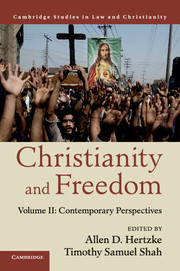Book contents
- Frontmatter
- Colophon
- Contents
- Contributing Authors
- Acknowledgments
- Introduction: Christianity and Freedom in the Contemporary World
- 1 Persecution in the Context of Religious and Christian Demography, 1970–2020
- 2 Patterns and Purposes of Contemporary Anti-Christian Persecution
- 3 Where the Spirit Leads: Global Pentecostalism and Freedom
- 4 Christianity among the Marginalized: Empowering Poor Women in India
- 5 Transnational Christian Networks for Human Dignity
- 6 The Growth and Dynamism of Chinese Christianity
- 7 Christianity and Religious Freedom in Indonesia since 1998
- 8 Christianity and Freedom in India: Colonialism, Communalism, Caste, and Violence
- 9 Vietnam: Christianity's Contributions to Freedoms and Human Flourishing in Adversity
- 10 The Challenge and Leaven of Christianity in Pakistan
- 11 Christianity and the Challenge of Religious Violence in Northern Nigeria
- 12 Copts of Egypt: Defi ance, Compliance, and Continuity
- 13 Between the Hammer and the Anvil: Indigenous Palestinian Christianity in the West Bank
- 14 Christians in the State of Israel: Between Integration and Emigration
- 15 Arab Muslim Attitudes toward Religious Minorities
- 16 They That Remain: Syrian and Iraqi Christian Communities amid the Syria Confl ict and the Rise of the Islamic State
- Index
15 - Arab Muslim Attitudes toward Religious Minorities
Published online by Cambridge University Press: 05 February 2016
- Frontmatter
- Colophon
- Contents
- Contributing Authors
- Acknowledgments
- Introduction: Christianity and Freedom in the Contemporary World
- 1 Persecution in the Context of Religious and Christian Demography, 1970–2020
- 2 Patterns and Purposes of Contemporary Anti-Christian Persecution
- 3 Where the Spirit Leads: Global Pentecostalism and Freedom
- 4 Christianity among the Marginalized: Empowering Poor Women in India
- 5 Transnational Christian Networks for Human Dignity
- 6 The Growth and Dynamism of Chinese Christianity
- 7 Christianity and Religious Freedom in Indonesia since 1998
- 8 Christianity and Freedom in India: Colonialism, Communalism, Caste, and Violence
- 9 Vietnam: Christianity's Contributions to Freedoms and Human Flourishing in Adversity
- 10 The Challenge and Leaven of Christianity in Pakistan
- 11 Christianity and the Challenge of Religious Violence in Northern Nigeria
- 12 Copts of Egypt: Defi ance, Compliance, and Continuity
- 13 Between the Hammer and the Anvil: Indigenous Palestinian Christianity in the West Bank
- 14 Christians in the State of Israel: Between Integration and Emigration
- 15 Arab Muslim Attitudes toward Religious Minorities
- 16 They That Remain: Syrian and Iraqi Christian Communities amid the Syria Confl ict and the Rise of the Islamic State
- Index
Summary
INTRODUCTION
Recent developments in the Arab world have shattered the feeble equilibrium that once existed. Uprisings in Egypt, Libya, Syria, and elsewhere have undermined long-established dictators and created an ever-present threat of violence in many parts of the region. In many cases, religious minorities are particularly endangered. The conflict in Syria has taken an increasingly sectarian tone in lockstep with its increasing level of violence. Conditions have become so severe that some Arab Christian observers outside Syria believe that this conflict “will likely be the final blow for Syria's embattled Christians.” Electoral victories for Islamist parties in Tunisia and Egypt (albeit a short-lived victory in the latter case) have certainly not comforted Christians and other non-Muslims in the Arab world. It seems that the birthplace of several of the world's largest faith traditions is still a hotbed of conflict between religious groups, and the outcome remains as uncertain as ever.
The growing uncertainty in the region – particularly for religious minorities – creates a vital need for understanding the social forces that shape relations between the faiths in these countries. If the Arab Spring revolutions were to bring about a more “popular” form of government, in contrast to the dictatorships that preceded them, then it is crucial to examine what popular demands might be. Popular rule does not necessarily mean tolerance. As Tocqueville famously warned, rule by the majority can result in highly unequal treatment of minority groups. There is thus no logical necessity that elections, however free and fair, will lead to improved conditions for non-Muslims in the Arab world; in fact, many observers have predicted just the opposite.
This chapter remedies some of the uncertainty regarding Arab attitudes toward religious minorities and religious freedom. Using recent original data from the Arab Barometer, it examines the attitudes of Arab citizens toward religious minorities through a number of different religious and political lenses. Furthermore, it considers the origins of these attitudes. Views about non-Muslims (and political policies relevant to them) were collected in ten Arab societies, providing valuable insight into the minds of everyday citizens in this important part of the world. In order to understand the plight of Christians and other religious minorities in the Arab world, we must consider the beliefs and attitudes of the Muslim citizens who make up the majority of the population in these countries.
- Type
- Chapter
- Information
- Christianity and Freedom , pp. 431 - 452Publisher: Cambridge University PressPrint publication year: 2016



